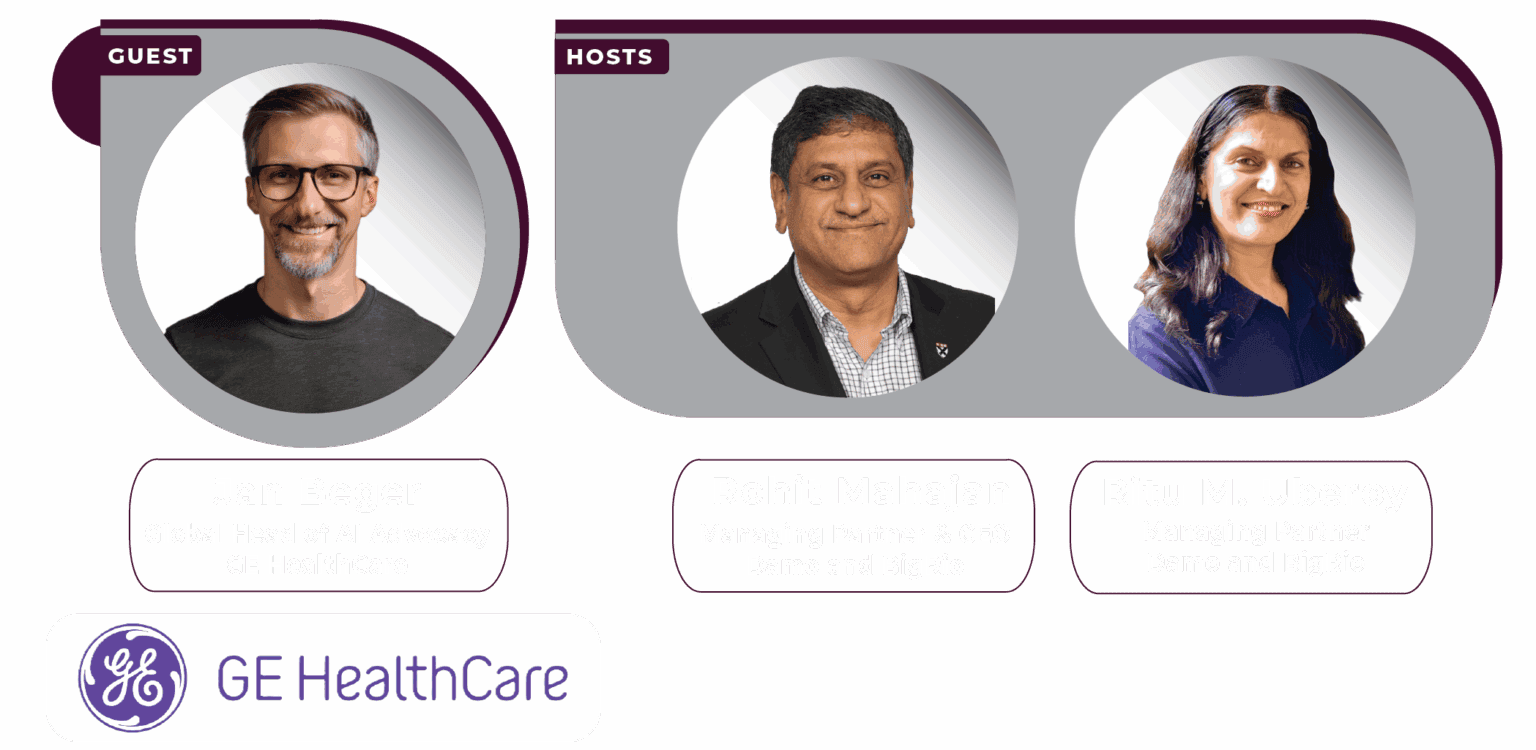Season 6: Episode #183
Podcast with Jan Beger,
Global Head of AI Advocacy,
GE HealthCare

Share
In this episode, Jan Beger, Global Head of AI Advocacy at GE HealthCare, shares his mission to bridge the gap between the conceptual promise and real-world impact of AI in healthcare. He stresses on the critical need to build AI literacy and trust among clinicians, executives, and students, and explains why a human-centric approach and strong change management are critical for successful adoption.
Jan highlights GE’s global AI literacy programs that train employees and clinicians on responsible use, practical applications, and critical evaluation of AI. He highlights how moving beyond pilots to strategic, systemwide deployment requires continuous education, executive engagement, and a focus on change management. He also spoke about GE’s successes such as improved efficiency in software development and innovations like AI-guided handheld ultrasound devices that democratize imaging by supporting users of varied expertise, as well as the challenges of keeping AI tools robust and up-to-date.
Jan addresses the future of the workforce, noting that adaptability and tech fluency will be essential as 70% of job skills evolve by 2030. He encourages healthcare leaders to see AI not just as technology, but as a transformative tool to enhance care and outcomes. Take a listen.
Video Podcast and Extracts
About Our Guest

Jan Beger Global Head of AI Advocacy at GE HealthCare, is on a mission to transform AI in healthcare from a conceptual promise into a practical, high-impact reality by equipping healthcare professionals with the knowledge and skills to drive this change.
With over 20 years of experience in healthcare informatics, medical imaging, and artificial intelligence, Jan bridges the gap between cutting-edge technology and real-world application. His work makes AI accessible, understandable, and actionable for healthcare professionals worldwide.
As Executive Director of HelloAI, a strategic educational initiative supported by EIT Health, Jan leads efforts to enhance AI literacy among healthcare professionals, medical students, researchers, and IT specialists. The program, which has reached over 3,500 participants across 70+ countries, offers a flexible, self-paced learning experience enriched by live online events. Through HelloAI, participants gain practical AI skills, empowering them to confidently integrate AI into clinical and operational workflows.
Beyond education, Jan focuses on driving real-world AI adoption. He founded Edison Accelerator, a start-up acceleration and healthcare provider collaboration program, developed by GE HealthCare in partnership with Telefónica’s Open Innovation Hub. This initiative connects healthcare providers, industry leaders, and startups to co-develop and integrate AI-enabled digital solutions, accelerating healthcare’s digital transformation.
Recognizing the importance of early AI education, Jan also founded GR4AI.Academy, a non-profit organization dedicated to helping children understand AI’s societal impact. Through this initiative, the academy provides a balanced perspective on AI’s opportunities and challenges, equipping future generations with essential AI knowledge from an early age.
Jan is committed to advancing AI literacy and adoption, empowering healthcare professionals to navigate and shape the future of AI. By providing the right knowledge and skills, he enables them to leverage AI effectively—enhancing decision-making, optimizing workflows, and improving healthcare delivery. His work ensures that AI is not just a technological advancement but a practical tool that supports clinicians, streamlines operations, and ultimately benefits patients.
Recent Episodes
Ritu: Hi Jan, welcome to our podcast. We are so happy to have you here on The Big Unlock podcast, season six, and we are headed to 180 plus episodes now. Really great having you on the show today. Just a brief introduction — my name is Ritu Roy. I am the Managing Partner here at BigRio and Damo Consulting and a co-host of The Big Unlock podcast with Rohit. And with that, I’ll hand it over to Rohit. He can give a brief introduction and then over to Jan. Thank you.
Rohit: Hi Jan, great to have you here, like Ritu said, and thank you for making the time in the evening from where you are in Germany. Really excited to have this conversation. I’m Rohit Mahajan, CEO and Managing Partner at BigRio and Damo Consulting. And with that, Jan, would you like to start with your intro?
Jan: Absolutely. First of all, thank you both for having me today and for the invitation. Truly appreciate it and looking forward to a good conversation about this exciting topic of artificial intelligence in healthcare. As you mentioned, my name is Jan Beger, Head of AI Advocacy at GE Healthcare. My mission is to transform AI in healthcare from a conceptual promise into a high-impact reality. I focus on equipping healthcare professionals, executives, and the next generation—like students—with the knowledge, skills, and mindset to thrive in this AI-enabled future of healthcare.
Ritu: That’s really great. Wonderful introduction and really interesting title you have, Jan, because we’ve talked to CIOs and CMIOs, but you’re someone who’s the Head of AI Advocacy. I think that’s something new. Would love to hear about your journey—how you came to be in this role, how you combine expertise in healthcare and AI, and what your vision for AI is at GE Healthcare.
Jan: Thank you so much. I hope you agree—based on the many conversations you’ve had in this space with different experts—when we talk about AI in healthcare, those conversations very quickly get technical. But I think in healthcare, and maybe as an entire industry, we have not focused enough on one important aspect: making sure that those clinicians and healthcare professionals we expect to use AI technologies are taken with us on this technology journey.
So, things like change management and education—making sure we focus on the human aspect—is something I think has not been emphasized enough across the industry, maybe even to a point that it slows down AI adoption. This is what I’m really focusing on—what we need to do to remove worries and fears among healthcare professionals, help them gain a solid understanding of the technology, build basic trust in AI, and get them interested in testing and piloting these solutions. Ultimately, the idea is this could lead to faster adoption.
Ritu: Yeah, that’s an extremely valid point, Jan, because I was just at a conference at MIT yesterday, and this was one of the key things that came up — that it can’t be a top-down approach because whenever you ask somebody to do something, their initial reaction is to go into defensive mode and say, “Why should I do something that’s going to take my job away?” or “What’s in it for me?”
So we would be really interested in hearing from you how you are able to get buy-in from the teams across GE and get everybody on board, making sure everyone has the literacy skills, like you said, to understand that AI can actually be a tool to do your job better, increase productivity, bring efficiency, and do all the good things AI promises.
Jan: First of all, I think across different domains and industries — in a health system, but the same in a medtech or healthtech company — everything is being reinvented right now in real time. There’s a lot of activity in that space.
We at GE also look into processes and how we can support our workforce with generative AI technologies. Again, the technology is one part of the story; the second is how we make sure we enable our workforce — 51,000 employees across the globe in 160 countries — to leverage this technology well and responsibly, to truly make a difference in their day-to-day work.
This is exactly the same in the healthcare space as well. We are entering a state of skill redefinition in real time. Things that were important in the past — like routine execution, static expertise, or hierarchical knowledge — are becoming less relevant. And on the flip side, we see more important skills emerging, like adaptability, systems thinking, tech fluency, and AI know-how.
We all have to prepare for this. There was a study recently done by Workday and LinkedIn, which said that 70% of job skills are expected to change by 2030, with AI driving much of this shift. This is not just healthcare — this is across different industries.
Maybe in healthcare, this kind of change will feel a little bit slower because it’s highly regulated. But what I want to say by mentioning this number is that there is a massive technology transformation ahead of us, and a lot of people don’t even understand that this is coming — and coming with quite some impact.
We not only need to continue building great technologies and integrating AI into products and workflows, but also need to create awareness and build AI literacy so that everyone across the healthcare ecosystem can use this technology responsibly for better care and improved patient outcomes.
Ritu: Thank you, Jan. That answer leads into two follow-up questions. First, like you said, the speed of invention is at an unprecedented scale, which we haven’t seen before. The speed is also leading to democratization, where anybody can do low-code or build a tool or a prototype.
That leads to the next thing — this whole concept of AI literacy. If the tools are so easy to use and can unlock so many new ideas, you want everybody across the company to understand how to use them and be fluent. So, how does GE, with such a large employee base — 51,000 employees across 161 countries — handle this? Do you have an overall AI literacy program with different levels, or what systems are you setting up to address this?
Jan: Great question. First, I should define what AI literacy means to me, because it could mean different things for different people.
In a nutshell, I would say it’s three things: one is the competencies required to collaborate responsibly with AI and interact with technologies such as large language models and generative AI.
The second is to be able to explain their outputs.
Third, it’s to be able to critically evaluate those outputs — and then do something meaningful with them. As you know, the worst thing would be to blindly trust those outputs and leverage them in your day-to-day work. So, critical evaluation is a very important part of AI literacy overall.
At GE Healthcare, there is an AI literacy program in place, which is part of a broader Responsible AI strategy. We have different ways to educate our teams — live sessions where they can dial in and learn from experts on how to use generative AI integrated into our tech stack, best practice sharing sessions, and self-paced learning offerings for employees at different levels — from a foundational course covering basic AI terminology to more use-case-specific, in-depth training for specific groups and roles.
Rohit: I was just wondering, Jan, about the key initiatives you’re taking, which are so valuable moving forward for the company and the employees themselves, because they’re basically increasing their skillset as well. We’ve been thinking about some success metrics for our own organization and for some of our clients who’ve been asking for similar services. Any thoughts or ideas, Jan, on what success metrics one could track for such initiatives in any organization setting out on this journey?
Jan: I think those success metrics and KPIs are critically important to measure traction and see where we’re heading and if the investment in these efforts makes sense. For instance, one area where we’ve seen early positive results is with our software developers. With AI capabilities, we’ve seen improvements in speed—getting code done, getting code reviewed, those kinds of things.
So this is maybe one area where, across industries, we already have several best practices and standard ways to measure performance and progress. But then there are other groups of employees where those measures are harder to obtain, or maybe it’s too early because we just started using these capabilities.
For instance, our field engineers—people who visit customer sites to check or repair MRI devices—now get AI support through tools we’ve developed where they can have a natural language conversation with the service manual of a specific device or get help with scheduling. Those are new use cases, and we’re still defining the right success measures or KPIs for them.
There’s a wide range of capabilities and use cases across different groups and business units. Over time, we’re getting better at measuring progress. As I mentioned, in software development we already have specific measures in place and are seeing the benefits of AI, but there are other areas where it’s still greenfield, and KPIs will evolve over time.
Ritu: Thank you, Jan. Our listeners—and most of us—always like to hear about success stories and success metrics, but it’s also important to learn from failure. It would be really interesting to hear from you about a couple of cases where things didn’t go so well, what you learned from that, and how you came back to do something even better.
Jan: I’ll give you an example of a tool we built in-house to support our marketing teams with approved external communication content. We’re feeding a retrieval-augmented generation model with external content so that when a communications specialist gets a request from the media, they don’t need to start from scratch—they can leverage this chatbot, get approved responses, tweak and refine them, and then use them.
It’s useful, but it’s also a lot of work—making sure the knowledge base of the chatbot is always up to date. Maintenance is a challenge and requires manpower and effort. So it’s not just a one-off where you build a cool AI tool and send it out for people to use. A lot of those tools require continuous focus, effort, and maintenance.
Rohit: While you do this at such a global scale, are you traveling a lot and meeting people in person to motivate them, or are you using online tools to make this happen? What are some of the key tools or methods you’re using for the advocacy you’re doing with such a large group of people?
Jan: That’s a great question. When I introduced myself, I should have mentioned that I focus most of my time on our customers—health systems, hospitals, and healthcare professionals—and focus my AI advocacy and literacy work mainly on clinicians.
To answer your question, I travel about 80% of my time. I’ll be in the US next week in Seattle and Atlanta. It’s important to meet medical and clinical experts in person. I always learn from them—I want to understand their concerns, fears, issues, what works, and what doesn’t. Even with great remote technology, face-to-face works best for me.
Of course, there are things that can be done online too. For example, for a few years we’ve been running an AI literacy program for healthcare professionals called Hello AI. When you go to helloai-professional.com, you’ll find more information. It’s a self-paced e-learning offering with two modules where clinicians, students, researchers, and executives can educate themselves about AI in healthcare.
We’ve received great feedback. So far, we’ve educated more than 5,000 healthcare professionals from over 70 countries. Later this year, we’re launching a new learning module built specifically for healthcare executives—because this population is becoming increasingly important in the overall transformation.
Over the last few years, healthcare systems have made progress adopting and piloting AI, but mostly through point solutions—like a decision-support tool in radiology or something with EHRs. Executives now need to think about AI strategically—how to plan, deploy, and measure ROI at a system level. That’s why we’re launching this new offering for healthcare executives on the Hello AI platform later this year.
Rohit: That is fantastic. I think there’s definitely a need for such a thing. Tell us a little more about Hello AI. How did it come into being? Did it precede your joining GE Healthcare, or is it a GE Healthcare initiative? We’d love to learn more about this venture.
Jan: Thank you so much. First of all, when we think about AI in healthcare, there’s often the impression that this is a domain led by big tech or the innovative healthcare AI startup ecosystem around the globe. But that’s only partially true. The reality is that when you look into AI and machine-learning-enabled medical devices, you’ll quickly realize that it’s also a huge play for traditional medtech.
Companies such as GE Healthcare and Siemens Healthineers are leading the pack. The FDA has authorized more than 1,000 AI-enabled medical devices so far, and about 100 of those come from GE Healthcare.
We feel a responsibility as a leader in this field not only to build and integrate great technologies into our devices but also to focus on the change management and education for those we expect to use these technologies. This is how it started—and what Hello AI is.
It’s a learning offering for healthcare professionals and executives built by a network of partners—GE Healthcare, universities, and technology companies—working together to spread the word. Our mission is to make AI literacy accessible and affordable for healthcare professionals worldwide.
We’re trying to provide healthcare AI–specific education, not just general AI education. There’s a lot of free AI content online from big tech, but we focus on healthcare-specific AI education at no or low cost. For instance, we currently have two modules: a free foundational course for everyone, and a more in-depth Professional course with 25 hours of content for just $99.
Rohit: That’s awesome. Would you be open to licensing this as well? In case a large enterprise is interested in your offerings, I’m sure you’re looking at some licensing deals too.
Jan: Our partnership model is threefold. First, we look for partner institutions to join Hello AI and co-develop new content. AI is a fast-paced field, and there’s a lot happening. For instance, earlier today we had a session on federated learning, which is part of new content we’re adding to our modules.
Second, we focus on co-marketing and co-promotion.
Third, when an institution joins us and contributes in these areas, we provide their employees or members free access to Hello AI content.
Rohit: That’s awesome. This is great—you’re offering such a robust platform to increase awareness and education in this space. As we come to the end of the podcast, Jan, any other thoughts or predictions in AI? There’s a lot of agentic AI coming our way—any thoughts for the future audience?
Ritu: And I think Jan wanted to show the device, which might relate to my question: do you have an example where AI has made a difference in patient outcomes—something you’ve put into a device that really made an impact?
Jan: Maybe just quickly, Rohit. I’ll share a use case that’s been very impactful, and then I’ll give a few takeaways. First, as I showed earlier, this is a handheld wireless ultrasound scanner for specific use cases. Imagine an emergency doctor carrying this wherever they go—a powerful imaging tool with no radiation. But one limitation is that it’s very operator-dependent. You need a certain level of education and experience to get high-quality medical images.
So a few years ago, we embedded AI into these machines. It tells you, while scanning the patient, how to move the probe to get high-quality images. This means even less-experienced clinicians can achieve excellent results. The idea is to democratize ultrasound so it’s accessible to more users. That’s just one of many examples of AI making an impact in healthcare today.
A few takeaways for your audience:
First, I strongly recommend everyone—whether in tech, corporate, or healthcare—start rethinking their job descriptions with AI in mind. Think about what you do every day, how AI could support you, and how it changes your role. When you start thinking this way, you’ll begin learning about AI, open your mind to opportunities, and adopt the right mindset to embrace this technology.
Second, we have so many great AI experts, data scientists, and developers worldwide working in industries like gaming or banking. If you know them, tell them about healthcare. If they truly want to make an impact on society, they should consider joining healthcare. It’s still early-stage and slower because of regulation, but if you have this expertise, the industry would truly value it. We can make a real difference here.
Ritu: Thank you, Jan. This was awesome. I’m sure listeners have a lot to absorb and reflect on. Your call to action is excellent—this is an industry where we can see the maximum impact and really help people. Thank you.
Jan: Thank you so much for inviting me.
————
Subscribe to our podcast series at www.thebigunlock.com and write us at [email protected]
Disclaimer: This Q&A has been derived from the podcast transcript and has been edited for readability and clarity.

Rohit Mahajan is an entrepreneur and a leader in the information technology and software industry. His focus lies in the field of artificial intelligence and digital transformation. He has also written a book on Quantum Care, A Deep Dive into AI for Health Delivery and Research that has been published and has been trending #1 in several categories on Amazon.
Rohit is skilled in business and IT strategy, M&A, Sales & Marketing and Global Delivery. He holds a bachelor’s degree in Electronics and Communications Engineering, is a Wharton School Fellow and a graduate from the Harvard Business School.
Rohit is the CEO of Damo, Managing Partner and CEO of BigRio, the President at Citadel Discovery, Advisor at CarTwin, Managing Partner at C2R Tech, and Founder at BetterLungs. He has previously also worked with IBM and Wipro. He completed his executive education programs in AI in Business and Healthcare from MIT Sloan, MIT CSAIL and Harvard School of Public Health. He has completed the Global Healthcare Leaders Program from Harvard Medical School.

Ritu M. Uberoy has over twenty-five years of experience in the software and information technology industry in the United States and in India. She established Saviance Technologies in India and has been involved in the delivery of several successful software projects and products to clients in various industry segments.
Ritu completed AI for Health Care: Concepts and Applications from the Harvard T.H. Chan School of Public Health and Applied Generative AI for Digital Transformation from MIT Professional Education. She has successfully taught Gen AI concepts in a classroom setting in Houston and in workshop settings to C-Suite leaders in Boston and Cleveland. She attended HIMSS in March 2024 at Orlando and the Imagination in Action AI Summit at MIT in April 2024. She is also responsible for the GenAI Center of Excellence at BigRio and DigiMTM Digital Maturity Model and Assessment at Damo.
Ritu earned her Bachelor’s degree in Computer Science from Delhi Institute of Technology (now NSIT) and a Master’s degree in Computer Science from Santa Clara University in California. She has participated in the Fellow’s program at The Wharton School, University of Pennsylvania.

Paddy was the co-author of Healthcare Digital Transformation – How Consumerism, Technology and Pandemic are Accelerating the Future (Taylor & Francis, Aug 2020), along with Edward W. Marx. Paddy was also the author of the best-selling book The Big Unlock – Harnessing Data and Growing Digital Health Businesses in a Value-based Care Era (Archway Publishing, 2017). He was the host of the highly subscribed The Big Unlock podcast on digital transformation in healthcare featuring C-level executives from the healthcare and technology sectors. He was widely published and had a by-lined column in CIO Magazine and other respected industry publications.
Stay informed on the latest in digital health innovation and digital transformation